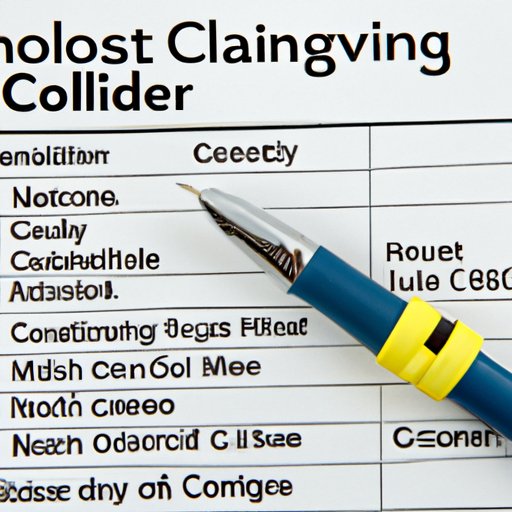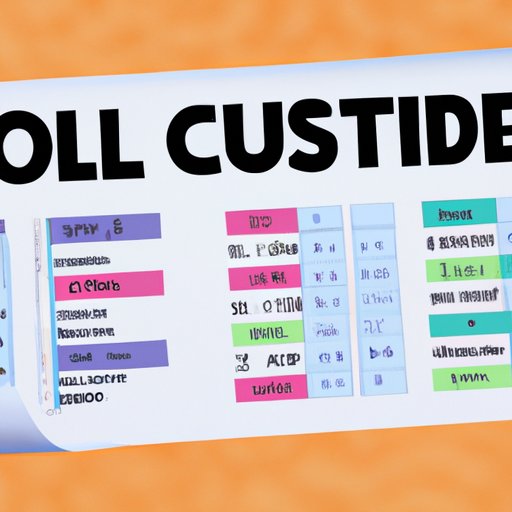Introduction
Closing costs are one of the most important considerations when buying or selling a home. It’s important to understand exactly what these costs entail and how they can affect your budget. In this article, we’ll take an in-depth look at closing costs, including what they are, how much they typically cost, and how to calculate them.

A Comprehensive Look at Closing Costs for Homeowners
Closing costs can vary greatly depending on where you live and the type of loan you’re getting. Generally speaking, closing costs are associated with the purchase or sale of a home. These costs include mortgage insurance, taxes, title insurance, homeowner’s insurance, appraisal fees, and escrow fees. Let’s take a closer look at each of these items.
Mortgage Insurance
Mortgage insurance is a type of insurance that protects lenders from losses if a borrower defaults on their loan. This type of insurance is typically required if you’re putting less than 20% down on a home. The cost of mortgage insurance is usually added to your monthly mortgage payment.
Taxes
Property taxes are assessed by local governments and must be paid annually. This amount is typically based on the value of your home. Depending on where you live, there may also be other taxes due at closing, such as transfer taxes and recording fees.
Title Insurance
Title insurance is a type of insurance that protects you from any issues related to the title of your home. This could include liens, unpaid taxes, or other claims against the property. Title insurance is typically split between the buyer and seller and is typically paid at closing.
Homeowner’s Insurance
Homeowner’s insurance is a type of insurance that covers the structure of your home as well as your personal belongings. Most lenders require you to have a certain amount of coverage before they’ll approve your loan. The cost of homeowner’s insurance varies depending on the size and location of your home.
Appraisal Fees
An appraisal is an independent opinion of value used to determine how much your home is worth. Lenders will typically require an appraisal before approving a loan. The cost of an appraisal typically ranges from $300-$500.
Escrow Fees
Escrow fees are typically paid to a third party who holds funds in trust until the transaction is complete. This is done to ensure that all parties involved in the transaction receive the funds they’re entitled to. Escrow fees are typically split between the buyer and seller and are typically paid at closing.
Closing Costs for Home Sellers
Home sellers are also responsible for certain closing costs. These costs can include real estate agent commissions, title insurance, and transfer taxes. Depending on the market, some of these costs may be negotiable.
How Much Does it Really Cost to Close on a House?
The cost of closing on a house can vary greatly depending on several factors, including the location of the property, the loan terms, and the size of the down payment. Let’s take a closer look at some of these factors.
Factors that Impact Closing Costs
Closing costs can vary greatly depending on the area you live in, the type of loan you get, and the size of your down payment. For instance, if you’re getting a government-backed loan (such as an FHA loan), you may be required to pay mortgage insurance premiums, which can add up quickly. Additionally, if you’re putting less than 20% down, you’ll likely be required to pay private mortgage insurance (PMI).
Average Closing Costs by State
Closing costs can vary greatly depending on where you live. According to the latest data from Bankrate, the average closing costs in the U.S. range from around $1,800 in Alabama to over $6,000 in Hawaii. However, these figures can vary drastically depending on the size and location of the property.
Estimating Closing Costs
It’s best to get a good estimate of your closing costs before you start the home buying process. A good place to start is by talking to your lender, who should be able to provide you with an estimate of your closing costs. You can also use online calculators to get a better idea of what you can expect to pay at closing.
Understanding the Different Types of Closing Costs
Closing costs can be broken down into two categories: non-recurring and recurring. Non-recurring closing costs are one-time expenses that are paid at closing, such as title insurance, appraisal fees, and taxes. Recurring closing costs are ongoing expenses that are paid each month, such as mortgage insurance and homeowner’s insurance.
What Factors Impact Your Closing Costs?
There are several factors that can influence the total cost of closing on a home. Some of the most common factors include the location of the property, the loan terms, and the size of the down payment. Other factors, such as the type of loan and the length of the loan term, can also have an effect on the total cost of closing.

The Ultimate Guide to Calculating Your Closing Costs
Calculating your closing costs can be tricky, but it’s important to get a good estimate of what you’ll be paying at closing. Here’s a step-by-step guide to help you calculate your closing costs.
Calculating Closing Costs for Homebuyers
For homebuyers, the first step is to talk to your lender to get an estimate of your closing costs. Then, add up all of the non-recurring closing costs, such as title insurance, taxes, and appraisal fees. Finally, add in any recurring closing costs, such as mortgage insurance and homeowner’s insurance. This should give you a good estimate of your total closing costs.
Calculating Closing Costs for Home Sellers
For home sellers, calculating closing costs is a bit different. Start by adding up all of the costs associated with the sale, such as real estate agent fees, title insurance, and transfer taxes. Then, subtract any credits you may receive, such as a buyer’s closing costs. This should give you an accurate estimate of your total closing costs.
Conclusion
Closing costs are an important consideration when buying or selling a home. It’s important to understand what these costs entail and how they can affect your budget. By understanding the different types of closing costs and how to calculate them, you can make sure you’re prepared for the costs associated with buying or selling a home.
(Note: Is this article not meeting your expectations? Do you have knowledge or insights to share? Unlock new opportunities and expand your reach by joining our authors team. Click Registration to join us and share your expertise with our readers.)
